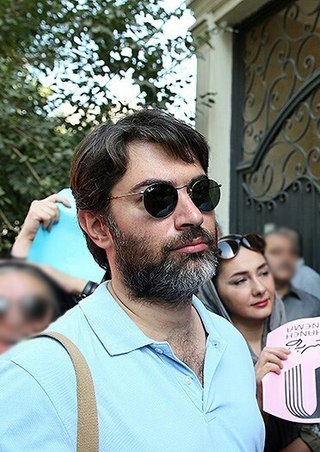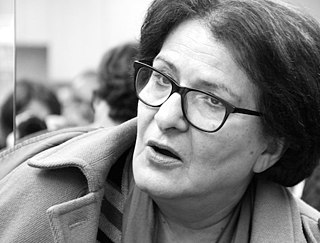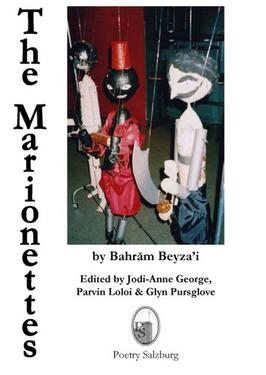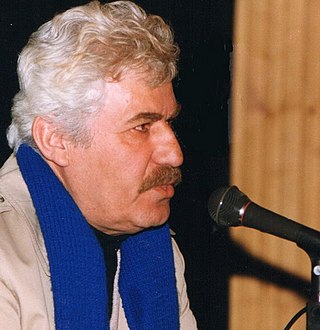Martin Julius Esslin OBE was a Hungarian-born British producer, dramatist, journalist, adaptor and translator, critic, academic scholar and professor of drama, known for coining the term "theatre of the absurd" in his 1961 book The Theatre of the Absurd. This work has been called "the most influential theatrical text of the 1960s".

Bahrām Beyzāêi is an Iranian playwright, theatre director, screenwriter, film editor, and ostād ("master") of Persian letters, arts and Iranian studies.

Ta'zieh means comfort, condolence, or expression of grief. It comes from the roots aza which mean mourning. It commonly refers to passion plays about the Battle of Karbala and its prior and subsequent events. Sir Lewis Pelly began the preface of his book about Ta'ziyeh maintaining that "If the success of a drama is to be measured by the effects which it produces upon the people for whom it is composed, or upon the audiences before whom it is represented, no play has ever surpassed the tragedy known in the Mussulman world as that of Hasan and Husain." Years later Peter Chelkowski, professor of Iranian and Islamic studies at New York University, chose the same words for the beginning of his book Ta`ziyeh, Ritual and Drama in Iran.
Persian theater goes back to antiquity. The first initiation of theater and phenomena of acting can be traced in ceremonial theaters to glorify national heroes and legends and to humiliate the enemy, as in the classics "Soug Sivash" and "Mogh Koshi" (Megakhouni). Ancient Persian theatre and dance was significantly researched by the Greek historian Herodotus of Halikarnassos, who lived during the Persian rule in Greece. In his work Book IX (Calliope), he describes the history of Asian empires and also the Persian wars until 478 BC.

Mahmoud Dowlatabadi is an Iranian writer and actor, known for his promotion of social and artistic freedom in contemporary Iran and his realist depictions of rural life, drawn from personal experience. In 2020, he wrote and recited a work called Soldier for the Art of Peace global project, composed and arranged by Mehran Alirezaei. He has collaborated with this project.

Parsa Pirouzfar is an Iranian actor, theatre director, painter, playwright and translator. He is best known for his role in In the Eyes of the Wind (2009–2010), and Mum's Guest (2004). He has received various accolades, including a Hafez Award and an Iran Cinema Celebration Award, in addition to a nomination for a Crystal Simorgh.

Hassan Fathi is an Iranian film director and screenwriter. He's one of the most well known and successful Iranian directors. Fathi is best known for his popular historical TV series.
Talat Hussain Warsi was a Pakistani actor and radio host.

Moniro Ravanipour is an Iranian-American and internationally acclaimed innovative writer who is the author of ten titles published in Iran, and many more in United States, including two collections of short fiction, Kanizu and Satan's Stones, and the novels The Drowned, Heart of Steel, and Gypsy by Fire. Her tales, described as "reminiscent in their fantastic blend of realism, myth, and superstition of writers like Rulfo, Garcia Marquez, even Tutuola," frequently take as their setting the small, remote village in southern Iran where she was born. Nahid Mozaffari, editor of Strange Times, My Dear: The International PEN Anthology of Contemporary Iranian Literature, wrote that Ravanipour "has been successful in the treatment of the complex subjects of tradition and modernity, juxtaposing elements of both, and exposing them in all their contradictions without idealizing either." Ravanipour was among seventeen activists to face trial in Iran for their participation in the 2000 Berlin Conference, accused of taking part in anti-Iran propaganda. Copies of her current work were recently stripped from bookstore shelves in Iran in a countrywide police action. She is a former Brown University International Writers Project Fellow.
Pre-revolutionary Iranian cinema contains films and cinematic events made in Iran before Iranian Revolution era. Hooshang Kavoosi, an Iranian film critic first used term Filmfarsi to point to Iranian popular films before revolution.

Gholām-Hossein Sā'edi MD was a prolific Iranian writer.

Ahmad Kamyabi Mask is a writer, translator, publisher, and current Professor Emeritus of Modern Drama and Theater of the Faculty of Fine Arts of the University of Tehran. He is a prominent scholar of French Avant-garde theater and influential in the study of Eugène Ionesco and Samuel Beckett.

Memoirs of the Actor in a Supporting Role is a 1982 play by Bahram Beyzai.

The Marionettes (1963) is a puppetry play by Bahram Beyzai, and one of the most important plays of the Persian language. It has been staged numerous times in various languages around the world. Together with two subsequent plays, namely Evening in a Strange Land (1963) and The Story of the Hidden Moon (1963), The Marionettes constitutes the playwright's puppet trilogy.
Death of Yazdgerd is a Persian play about the death of Yazdegerd III by Bahram Beyzai, often considered his magnum opus, which he adapted into a film of the same name.
Death of Yazdgerd is a 1982 Iranian drama film by Bahram Beyzai based on the play of the same name.

Enayatollah Bakhshi is an Iranian veteran actor. During five decades of artistic activity, he has appeared in more than 150 plays and considered one of the most well-known actors played the antihero role in the history of Iranian cinema. He is cooperated with some of the notable Iranian film directors, including Ebrahim Golestan, Bahram Beyzai, Ali Hatami, Amir Naderi, Masoud Kimiai, Dariush Mehrjoui, and Davood Mirbagheri. He has received a First Grade Certificate in Art from the Ministry of Culture and Islamic Guidance of Iran.
Matryoshka is a Persian-language satire based on selected short stories of Anton Chekhov, translated, written, and directed by Parsa Pirouzfar. The play has over 30 characters all performed by the playwright and the theatre director Parsa Pirouzfar in its theatrical production.
Mohammad Reza Ghanoonparvar is a Professor Emeritus of Persian and Comparative Literature at the Faculty of Middle Eastern Studies at the University of Texas, Austin, whose expertise includes the works of Simin Daneshvar, Sadeq Chubak, and Sadeq Hedayat.











